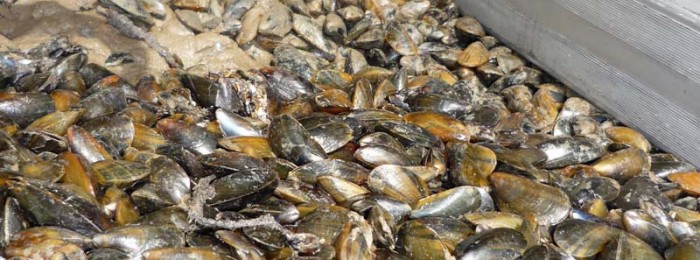01843 585310
info@kentandessex-ifca.gov.uk

01843 585310
info@kentandessex-ifca.gov.uk

Mytilus edulis The common mussel is a bivalve mollusc found on shores throughout the North Atlantic, Mediterranean, North and Baltic Seas. Usually living in large aggregations attached to rocks, hard structures and each other with the use of sticky threads known as byssys, mussels filter feed on small plankton and other detrital material suspended in the water column.
Mussels can be found from the high intertidal zone to the shallow sub-literal zone making them a hardy species capable of withstanding extended periods of time exposed to air. To prevent desiccation, or to protect their soft tissues, mussels close their two valves using a strong adductor muscle. Spawning into the water column occurs in spring and can happen a second time in mid to late summer to a lesser extent. Fertilised eggs develop in the water column until metamorphosed into spat ready to settle on appropriate substrate.
Mussels from an important part of the food chains in the habitats they are found in providing a valuable food source for species of crab, starfish, finfish species and birds. Competition for settlement space on the shoreline and suitable attachment points on hard intertidal structures is high with other intertidal sedentary species such as barnacles (Semibalanus balanoides) and pacific oysters (Crassostrea gigas).
© Kent & Essex IFCA 2026 - All Rights Reserved | Privacy Policy
| Website by 